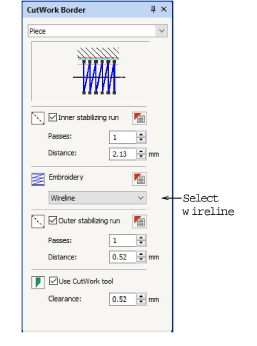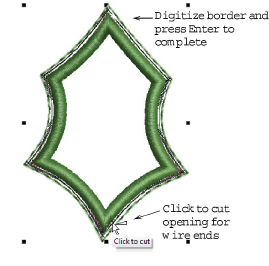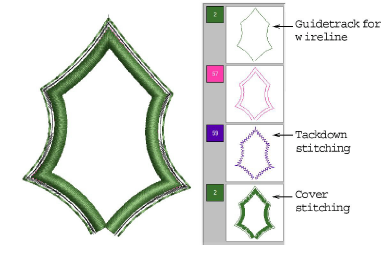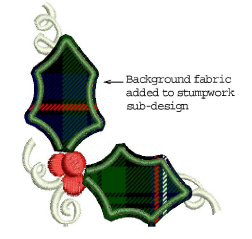Create stumpwork with wirelines
Digitizing with wire and fabric is probably the commonest scenario for creating stumpwork. This involves digitizing a simple cutwork piece and turning it into a stumpwork sub-design. This is then sewn onto a separate piece of fabric, often patterned, with the inclusion of a wire, and then cut out and attached to the base design. Required tools are listed above.
Tip The Digitize Open Cut and Digitize Closed Cut tools can also be used as both ‘Cut’ and ‘Piece’ borders can form stumpwork sub-designs.
To digitize stumpwork with a wireline...
1Select the Digitize Piece tool and make sure ‘Wireline’ is selected as your embroidery type. See Cutwork concepts for details.
2Open the object properties to adjust your wireline gauge and cover stitch settings.
When you use ‘Wireline’ as your embroidery type, the following properties can be set:
|
Setting
|
Notes
|
|
Tackdown
|
The gauge of wireline you are using determines the width of guidetrack and tackdown stitching. You can choose to factor it into your cutwork properties or use the default value.
|
|
Wire gauge
|
The wire gauge numbers correspond to the American Wire Gauge (AWG) codes. This is a standardized wire gauge system for the diameters of round, solid, nonferrous, electrically conducting wire. The larger the AWG number or wire gauge, the smaller the physical size of the wire.
|
|
Cover stitch
|
Satin is the default. Alternatively, Blanket can be used. Width and spacing can be adjusted for both.
|
3Digitize your border as you would any other closed object.
4Press Enter to complete. A cutwork piece border is generated based on the CutWork Border presets. You are prompted to mark a cutting point.
5Alternatively, use the Cut Closed Border tool after the fact, to cut the border and leave an opening for wire ends.
6Optionally, use the Digitize Wireline tool to insert additional wirelines for extra support. See Digitize additional wirelines for details.
7Select the objects and click Create Stumpwork Sub-design. Selected objects are bundled into a composite object which resides on a separate ‘layer’ to the base design.
Stumpwork sub-designs are not visible in color list of the Color Film docker. They are only visible in the object list.
8Optionally, edit your stumpwork sub-design by double-clicking or clicking Open Stumpwork Sub-design.
The stumpwork sub-design opens in a separate window where you can edit properties such as wire gauge, satin cover width and offsets, etc. Optionally, add a background indicative of the fabric you will be using. See Edit stumpwork sub-design for details.
9Use Export Stumpwork Sub-design to save your stumpwork sub-design as a separate design file.
Study the stumpwork design samples included in the installed ‘3D Embroidery’ folder. Try stitching out to practice the techniques involved. Check your BERNINA machine documentation.













